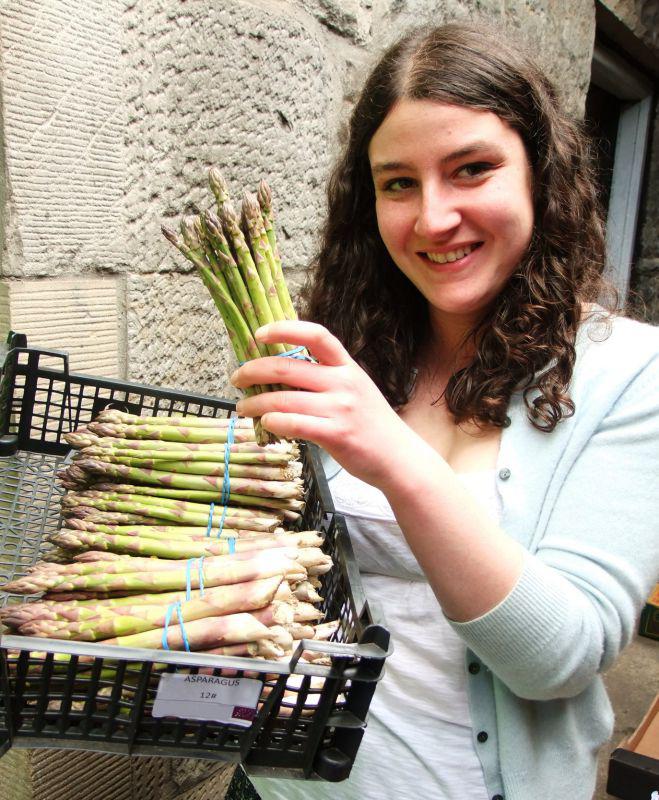Asparagus

Asparagus is in season in Britain for just a few short weeks. So grab those melt-in-the-mouth spears while you can and feast! Asparagus is one luxury you can definitely afford.Asparagus has been used as a vegetable and medicine, owing to its delicate flavour, diuretic properties and more. Still in ancient times, it was known in Syria and in Spain. Greeks and Romans ate it fresh when in season and dried the vegetable for use in winter.
Asparagus contains more folic acid than any other vegetable. It's also a good source of fibre, potassium, vitamins A and C and glutathione, (a phytochemical with antioxidant and anti-carcinogenic properties).
Store it
Once picked, asparagus rapidly loses flavour and tenderness, so it really is worth eating it on the day you buy it. If that isn't possible, store asparagus in the fridge with a damp paper towel wrapped around the bottom of the stalks and you can get away with keeping it for a couple of days.
Prepare it
Wash in cold water and remove the bottom ends of the stalks (with fresh asparagus they will snap off cleanly). Boil or steam quickly until just tender, around 4 to 7 minutes depending on thickness.
Eat it
Drop loose spears into a pan of boiling water and cook until just tender. The cooking time varies according to the thickness of the stems, but ranges between 3-5 minutes. Once it's cooked, drain and pat dry on kitchen paper. Try using perfectly cooked spears to dunk into soft boiled eggs.
Or asparagus griddled and served with a drizzle of your best extra virgin olive oil, salt, pepper, a squeeze of lemon juice and a grating of Parmesan. Try it chargrilled with some halloumi for a lovely summery dish.
Sweet, juicy and fragrant, peaches are one of the most beautiful fruit around. Around the size of a tennis ball, they are covered with a velvety down, and most commonly have a red-blushed yellow skin and golden yellow flesh, apart from white peaches, which have a pink-blushed cream skin and pinkie white flesh. It's possible to find flattish, disc-shaped varieties of peach, but the most common type is spherical, with a little peak (known as a 'beak') at one end. Just like nectarines, they come in either clingstone or freestone varieties - the name indicates how easily the stone is freed from the flesh.
Peaches are a source of vitamins A and C and they are a good source of fibre especially eating the skin. Peaches are also a good source of potassium and contain some calcium, magnesium, phosphorus and folate.
Store it
Peaches will ripen at room temperature, or if you'd like to hurry them along, place them in a paper bag and they'll ripen sooner. Once ripe, they'll keep in your fridge for up to a week. If you're slicing them up, try popping a little lemon juice on them to keep them from going brown.
Prepare it
Cut around the fruit with a sharp knife following the natural dimple, then twist each half apart. Slice or chop as required. If there is too much fuzz on the skin for your taste, you can rub it off under cold water. Tough skin can be peeled off with your fingers, or drop the peach into boiling water for around 15 or more seconds then plunge immediately into cold water. The skin should then come away easily.
Eat it
Eat raw, as they are, or slice and add to fruit salads, pavlovas or trifles. Use to make tarts, or serve with vanilla ice cream or cream. Poach (10 minutes for whole; 4-5 for halves). Halve and roast (15-20 minutes).If you are not going to eat cut peaches straight away, brush the cut sides with lemon juice or acidulated water to prevent them going brown.
Why eat seasonally?
There are a number of excellent reasons to eat seasonally.
-
Firstly, it reduces the energy required to produce food., through reducing transport, we reduce CO2 emissions and our carbon footprint.
-
Secondly, it's a lot cheaper, by not paying for the air miles food has travelled or paying a premium for scarce goods.
-
Thirdly, you're helping to support our local economy.
In addition, a lot of people feel it helps connect them to the change of seasons and natural cycle of the year. As if that wasn't enough, seasonal food is fresher, so it tends to be tastier and more nutritious!
Click here to take a look at the full range of fresh organic fruit and vegetables available online at Real Foods.